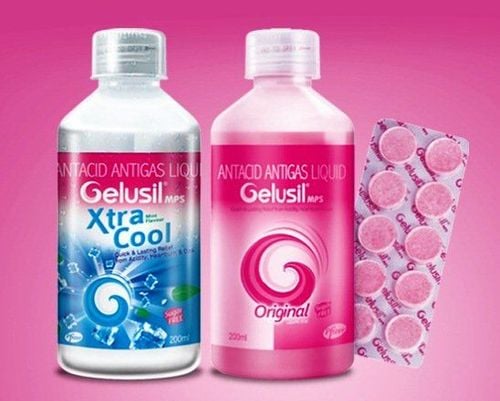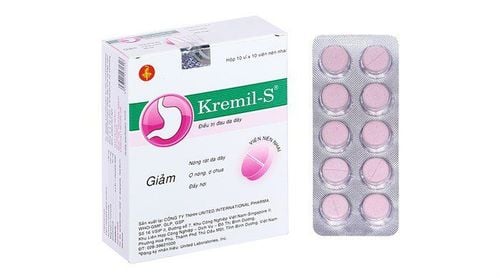The stomach is a key aspect of the digestive process, and it secretes digestive juices to help break down meals. However, when the stomach produces too much acid, it creates unpleasant symptoms and even pathology. At that point, the patient must utilize stomach acid neutralizers like Gelusil. So, what is Gelusil?
1. What is Gelusil?
What is Gelusil? Gelusil is a medication that treats stomach symptoms caused by excessive acid secretion, such as stomach pain, heartburn, and indigestion. Gelusil is also used to alleviate symptoms such as vomit and abdominal pain, as well as the sensation of stomach or intestinal tension.
Gelusil contains the key component simethicone, which helps break down gas bubbles in the digestive tract. At the same time, other elements, such as aluminum and magnesium, will quickly neutralize and reduce stomach acid.
Patients should be aware that liquid antacids are more effective and faster-acting than tablets or capsules. Gelusil merely neutralizes excess acid in the stomach, not preventing it from creating acid. As a result, Gelusil can be used alone or in combination with other medications that reduce stomach acid production. Some products share the same trade name as Gelusil but have different constituents and uses.
2. Instructions for using Gelusil
Gelusil is taken orally, usually after meals and before going to bed. Patients should follow all instructions on the packaging of Gelusil or as directed by their doctor. If taking Gelusil chewable tablets, chew thoroughly before swallowing, then drink plenty of water (about 240 ml).
If you are using the liquid form of Gelusil, shake the bottle well before each dose and use the measuring device provided to measure the dose carefully. Do not use a household spoon to measure Gelusil, as you may not get the correct dose.
You can refrigerate the Gelusil solution to improve the taste, but do not freeze it. The liquid form of Gelusil will be most effective when taken without other solutions.
Gelusil may react with other medications (including digoxin, iron, pazopanib, tetracycline antibiotics, and quinolone antibiotics) and prevent their complete absorption. Talk to your doctor or pharmacist about your medication schedule to prevent this problem.
If symptoms of excess stomach acid persist or worsen after 1 week of taking Gelusil or if you think you have a serious problem, seek medical attention immediately.

3. Side effects of Gelusil
Gelusil may cause nausea, constipation, diarrhea, or headache. If these symptoms persist or become severe while taking Gelusil, notify your doctor immediately.
Magnesium in Gelusil may cause diarrhea. On the contrary, aluminum in Gelusil may cause constipation. To minimize constipation, drink plenty of water and exercise. According to statistics, the risk of diarrhea from Gelusil is higher than constipation.
The antacid Gelusil contains aluminum, which can bind to phosphate - an important chemical in the body found in the intestines. That explains why Gelusil can cause low phosphate levels, especially if you take Gelusil in large doses or for a long time. Tell your doctor immediately if you have symptoms of low phosphate levels, such as loss of appetite, unusual tiredness, or muscle weakness.
Some of the most serious side effects of Gelusil that may occur and require immediate medical attention include dizziness and fainting.
Get medical help right away if any of these rare but severe side effects of Gelusil occur:
- Black or tarry stools;
- Slow/shallow breathing;
- Slow/irregular heartbeat;
- Mental/mood changes (e.g., confusion);
- Deep sleep;
- Pain when urinating;
- Abdominal pain;
- Vomit that looks like coffee grounds.
4. Precautions when using Gelusil
Before taking Gelusil, tell your doctor or pharmacist if you are allergic to aluminum hydroxide, magnesium, simethicone, or other allergies. If you have any of the following health problems, consult your doctor or pharmacist before using Gelusil: regular alcohol use, severe dehydration, kidney problems (including kidney stones).
Gelusil contains aspartame. If you have phenylketonuria (PKU) or any other condition that requires you to limit your intake of aspartame (or phenylalanine), consult your doctor or pharmacist about the safe use of Gelusil. If you have diabetes, consult your doctor or pharmacist about whether you should use Gelusil.
After discussing the risks and benefits with your doctor, Gelusil should only be used during pregnancy when clearly needed. Gelusil can pass into breast milk, so nursing mothers should consult their doctor before using it.

5. Interactions of Gelusil
If you are taking Gelusil as advised by your doctor, your doctor or pharmacist will inform you of any potential drug interactions and teach you how to monitor them. As a result, you should not start, stop, or change the dosage of any other medication you are taking with Gelusil without consulting your doctor first.
Before using Gelusil, contact your doctor or pharmacist if you are taking any of the following herbal products, prescription or nonprescription pharmaceuticals, or phosphate supplements (potassium phosphate).
Antacids can interfere with the absorption of many other medications, so consult your pharmacist before using antacids (such as Gelusil) with any other medications. This document does not include all of Gelusil's probable interactions. Therefore, before using Gelusil, tell your doctor or pharmacist about all the products you are using.
Lifestyle transformations, such as stress reduction, stopping smoking, limiting alcohol use, and modifying your diet (avoiding caffeine, fatty meals, and certain spices), can all help Gelusil work better. If you routinely use Gelusil and miss a dosage, take it as soon as you remember. If it is almost time for your next Gelusil dose, skip the missing dose rather than double it.
Gelusil should be kept away from light and moisture. Gelusil liquid can be stored in the refrigerator to improve its taste; nevertheless, it should not be frozen, stored in the bathroom, or kept away from children and dogs. Gelusil should not be flushed or poured down the drain until it has expired or is no longer needed.
Gelusil is a medication used to alleviate symptoms of stomach acid secretion. To guarantee treatment efficacy, patients must take the medication strictly as recommended or follow the doctor's or pharmacist's recommendations.
To arrange an appointment, please call HOTLINE or make your reservation directly HERE. You may also download the MyVinmec app to schedule appointments faster and manage your reservations more conveniently.
Reference source: webmd.com













